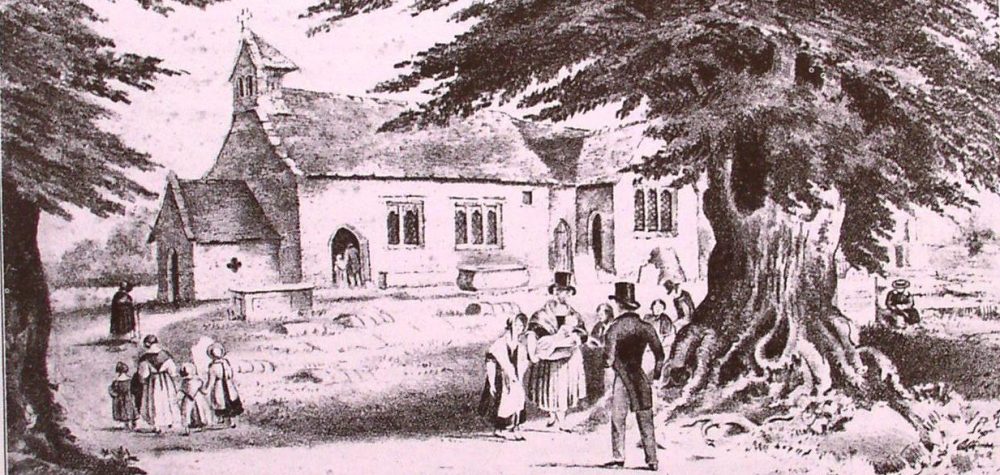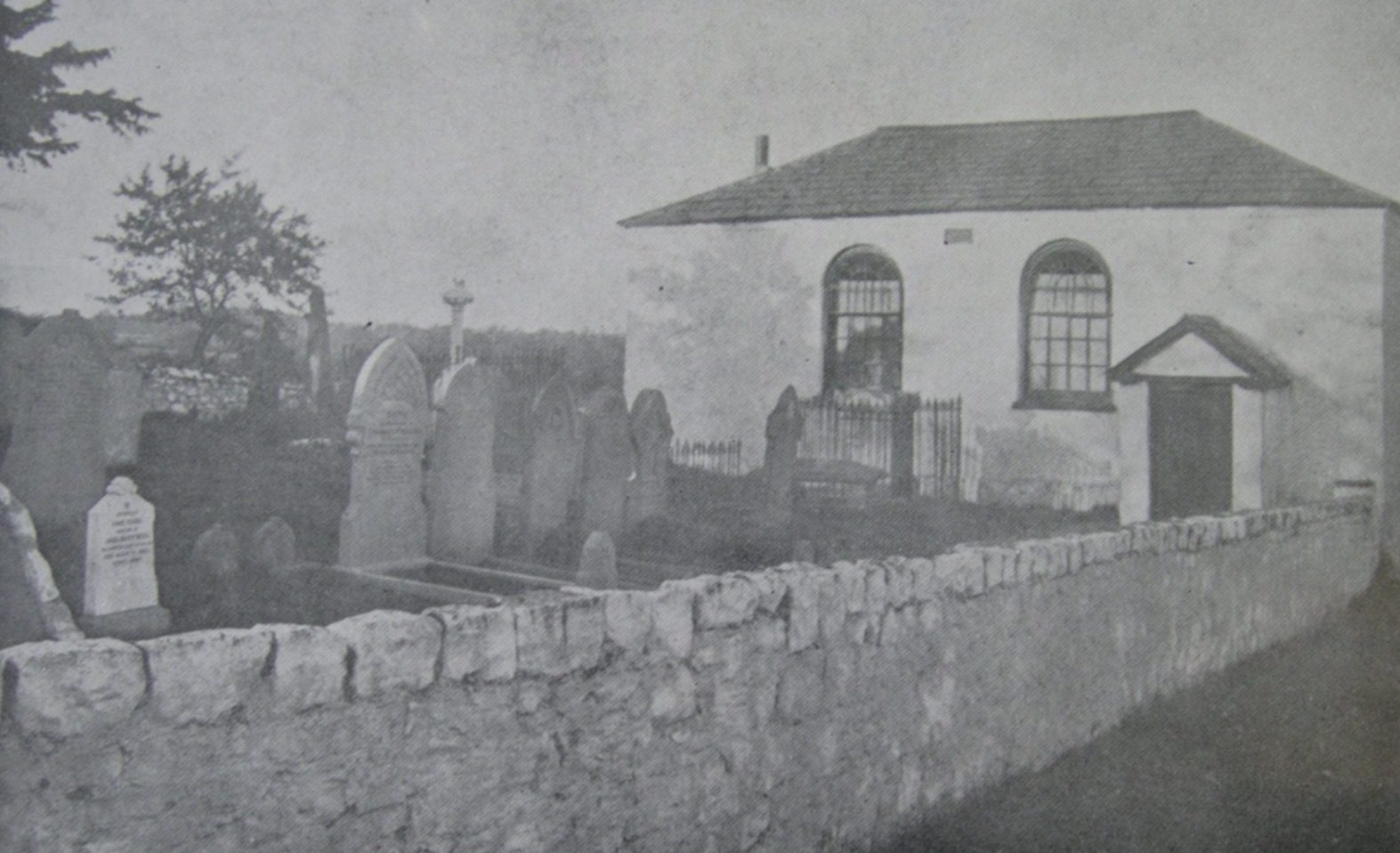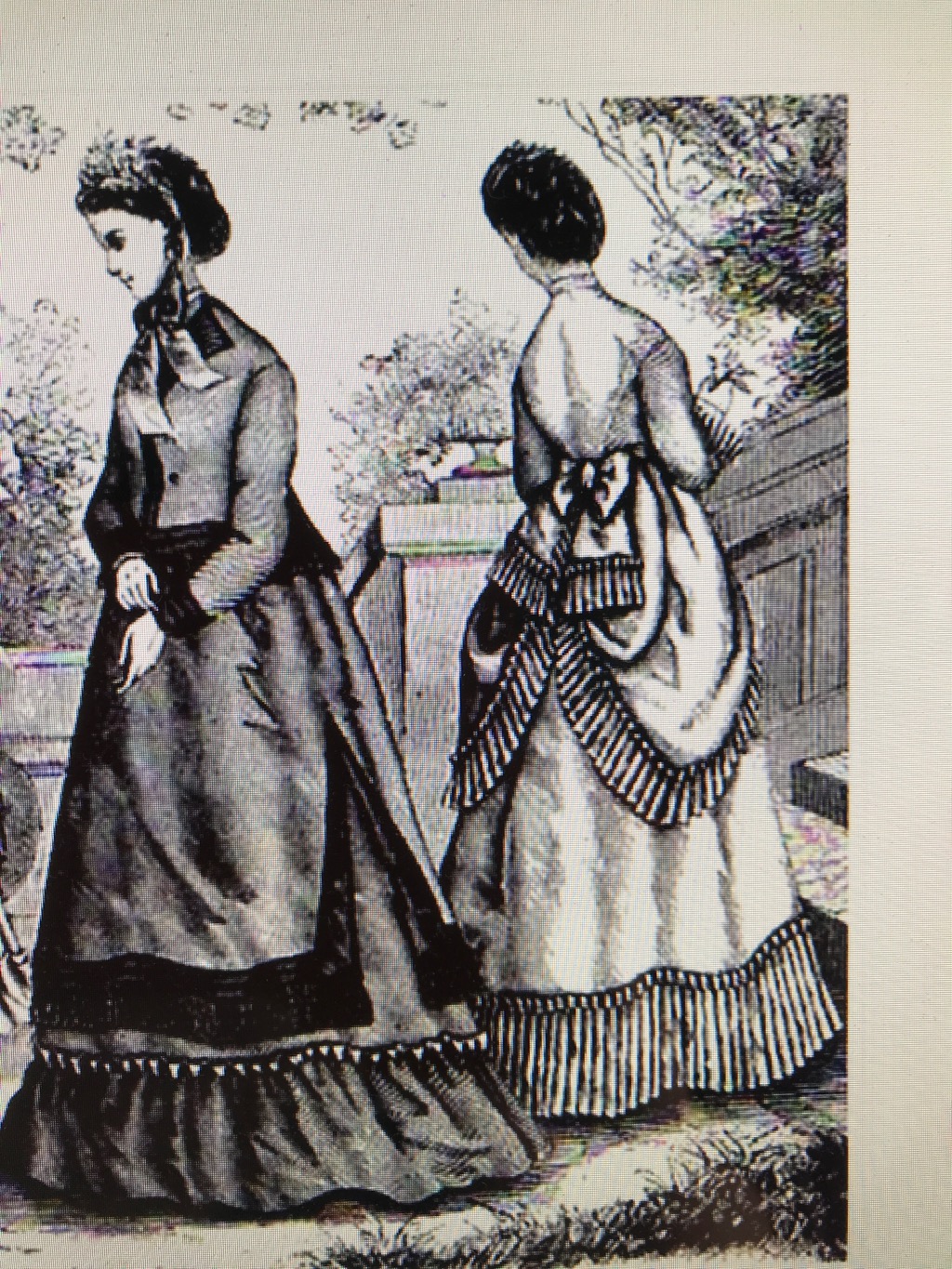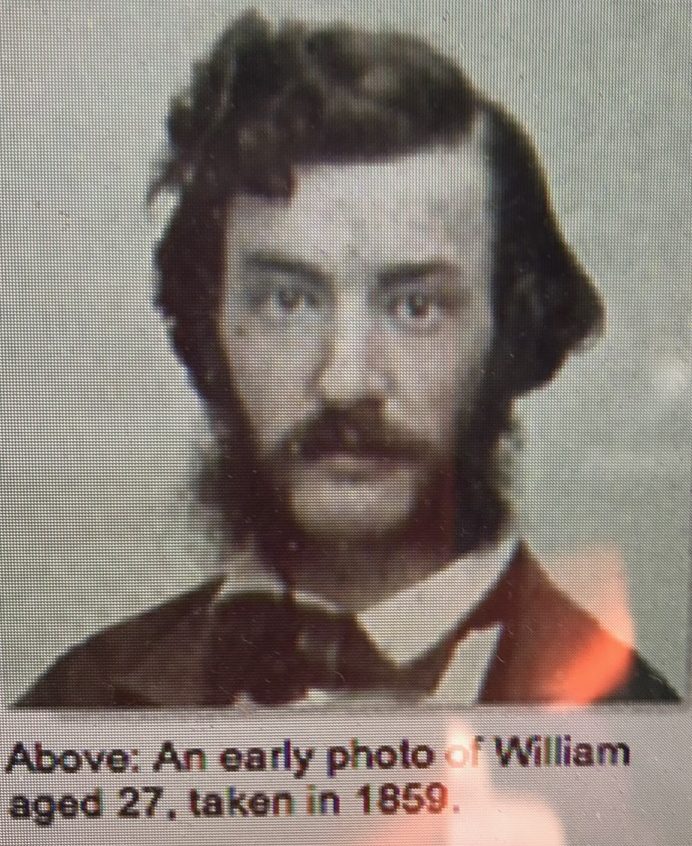T 18
H Bird Dec 7th 1831 – From his aunt Charlotte
Goitre – 1832 Journal
Jan’y
- Sunday went to Goitre Church in the morning Mr Davies preached at Goitre his that way from the 13th of Luke’s and verses 8 2 new
- Monday Mr Davies came to tea he informed me that he was going to Cardiganshire for 2 or 3 weeks
5th we all went to Llanover shooting, had several shots but killed nothing
6th went with Mr Dix to Abergavenny and dined at Mr Grieves on the way back
8th Sun. Charlotte’s eye was too bad to go to Church. Mr Jenkin Hughes did his duty at Goitre. His text was taken from 3 chapter Melachi2 – but who may abide gladly of his coming or who shall stand whenever appeareth first him coming for the future coming of the saviour 2nd he explained the .. in the latter part of the very excellent sermon
9th went to Mr Walbeoff Llanover to dinner. Met the William’s of Llanvrechva it was Mr Gardeners birthday by whom I was a share he was 21 years of age.
10th Tues. I went out shooting. Uncle killed a cock pheasant.
11th W. Set out altogether for Mr Webb’s but it rained so dreadful we were obliged to turn back with a drenching.
12th went out to Mr Webb’s did not come home till 11.
13th went again out shooting. Had not a shot
15th S. We churched at Goitre
16th Mon. Went to Mr Webb’s rode to Abergavenny with Mr Gardiner we dined at Mr Grieves
19th Mr and Mrs Dix went by the coach to Bristol
20th we went to Usk with uncle. Did not come home until 12 o’clock that night
22nd S. Aunt Charlotte’s eye was so bad to go to church. Only uncle and myself went. Mr Evans preached at Goitre, his text was taken from 9 chptr of St Luke’s & 26 verse. For whosoever shall be ashamed of me and my words of him shall the son of man be ashamed we come in his own glory and his fathers and of the Holy Angels
23rd M. went out shooting. I killed a hare in Coed Howell
24th Tu. Went to Mr Webb’s to see Gardener played 2 games of chess with him. Cold but very mild weather.
25th went out shooting again on the side of the hill, very little sport, there seems to be very few woodcocks in the country
28th went to Mr Grieves with our guns, killed nothing
29th took calomel according to Mr Grieves desire, did not go to church
31st went to Mr Webb’s and slept there that night
Feb.y went to Mr Marfield of Lancha? Shooting being the last of pheasants. It came on to rain which obliged us to?
2nd Th. When we came home I found that Mr Mais had written to Mr Griffith’s of Usk asking him to inform me that he desired my attendance on him immediately
3rd set out for Bristol came by the Lady Rodney for passage arrived at Bristol at 6 o’clock
5th Sun. Went to St John’s church, Mr Porter preached; lest them alone until?
10th set out for London. Walked on the road for 6 miles, got on a coach which took me to Bath. Called on aunt Winstone, saw there aunts Fanny and Lucy, the latter was going to Goitre the next day. Got on the New Company’s coach at 3, did not arrive in London till 7 next morning, breakfasted with aunt Chalken at Kensington then went on to Pentonville to aunt Heston’s at 9. Met Henry Louis and Jones at Mr Eagles office at 6 being the 11th Feb
12th I went for a walk with uncle Geo Chalken instead of going to church, went with Louis to Kensington after dinner & returned to Pentonville to sleep.
13th went together to Mr Van with Fanny, Louis, Louisa and myself where we met Uncle George and from there to the Court of Chancery. A Mr Bicknell took us all into the vice-chancellors viz Sir Lancelot Shadwell together with a gentleman from Mr Vans, a solicitor or something in that line. We had to do nothing but only appear for forms. After we had settled there I went to Mr Price and he told me to see Major Bennett if he could go with me to Lord Hill. After I had seen Major B. I had to go again for further directions.
14th went twice to the Senior United Service Club
15th Wed. Went again to the club but did not see Major Bennett. I enclosed Mason’s letter to him. Called on Mr Price who corrected a letter that uncle George Chalken had written for me to send to Gen. Maitland. I went and waited out in Grosvenor Square and he would give him my card, he was very kind to me indeed. I then went back to Coleman Street and saw Major Banks but he gave me no encouragement relative to my future prospects in life but told me that a commission was very difficult to get, which I could have told him.
18th Sat. Went to the club but Major Bennett was not there, waited until 3 and saw him. He said that he was going to sail on Wednesday for Jamaica and required that he will call on Tuesday next at 11 o’clock. I saw Mr Price he said that Gen King would do as well as introducing me in person
19th Sun. Eye not very well, took some salts and staid at home. Mr Chalken and Margaret came to dinner
20th Mon. Went to General King’s for my letter. He told me to let him know??
21st Tues. My name happening to be the first on the list I was not there much too soon. Lord Fitzroy seemed inclined to do what he could for me, said he would recommend my case to Lord Hill and that I had better see the Lord on Thursday. I of course saw Gen. King who said that was very favourable. I wrote to aunt Lucy and mama that evening
23 Thursday. Went to the horse guards at x o’clock and put down my name, no. 24. I saw Lord Hill about 3. He was very kind in his manner, told me that it was uncommonly difficult to get a commission without purchase particularly now we looked very bad owing to the thick fog. He said that he was disposed to do all he could for me, both on account of my father’s service and my own appearance but as there were so many admissions from the college therefore we were obliged to attend to that there were few we can? but the first we had to dispose of and would think of me now but he did not promise me a commission, he said that I had better have some advice for my eye while I was in town and that I had better go home to my friends for a time and improve myself as much as I could by reading. I said everything I could think of to strengthen my claim on the service. Afterwards called on Mr Price and Gen. King but could hardly see anyway on account of the density of the fog.
24 Fri. Boot called me so I staid in
26 Sun. Went to Kensington to Church. Heard a Mr Pittman he gave us a very good sermon his text was taken from the 9th of 27 verse Luke. He made several short appeals to our consciences and spoke the truth very plainly
27 Mon. Went to Highgate with a parcel for Mr MacDonald. Wrote to Mrs Towgood and? Eye better called on the Curtons where I drank tea.
28 went to St John’s Wood and saw the Walters thought they looked very well. Called on Lady Trotter she was very ill and did not see me, had nearly an hours chat with Miss Trotter. Went also to Mr Price whom I drew 4£ on account of compassion of money
29 W. Went to the office and took my place to go next day when I came home I found a note from my cousin Maria saying she could not let me go down to Goitre without spending 2 or 3 days with her. I put off my place a week
March
- Th. Went down to Dartford in Mr Towgoods gig
- Fri. Went with my cousin over to Wanscomb
5 snow, we visited Saint Wansey? Mr Man and myself let off 8 doz sparrows from a trap only shot 6
8 Th. I did not start from Dartford till early that morning, staying over nightly prevented me from taking me up either Thursday or Wednesday. We went with one to Major Banks saw only the clerk. He said that I ought to see ? Before I left town. Mr Towgood inquired which was the best and cheapest way for us to go out to Ceylon which he thought a most desirable object. my place to another day but now I gave 1s which I had paid. I went down with him that night and came up with him again next morning
9 Fri. We saw Mr Ferres and Major the former told us there is a passage for 60£-70£ and that if he heard of anything that would be favourable to my object he wd let me know next said if I cd get out cheap Mama cd allow me a maintenance on the Gampolar Estate but that I cd do nothing till I was of age. Mr Navara could give me power of attorney to act under the executors and that should I get a commission I could receive it more by exchange but that it was not worthwhile going to the expense and if I had any hopes of getting a commission soon had I that if I cd get out I should be of use there to the estate but now as a looker on till I was of age he gave his letter to read and to take down with me which mama had but then for perusal from Capt. Braybrook, he gave a very unfavourable account of my uncle George and even goes as far as to state that he dishonestly disposed of the coffee ? and appulates the money to his own use and many other things but that the estate only wants proper management to clear itself that the crops are good but that only about half as much accounted for. I think he wd not state as much without some reason for so doing but there is no doubt fault on both sides.
I left Mr Towgood returning to go on Sat afternoon to Bristol he was very kind to me indeed and told me if I ever needed him to do anything for me to write.
Sat I went to Kensington. I was taken up at the Holland Arms by the new companies Bristol coach at 4 we did arrive in Bristol at 10 on Wednesday morning I did not go to church and my eye being very bad.
Sun dined with mama that day and the following. My eye continued to get better but had a very bad continued cough (more but unable to decipher)
Sun I went to St Michael’s church Mr K preached his text from the 1st ch of Ezra from 1-5. I did not like him greatly as Mr Davis from Goitre
19 on Monday the 19th I started again from Bristol for Goitre after having been away 6 weeks and 1 day in which time I had been to London about the estate to make myself appearance at the chancery court & had made a personal application to Lord Hill the Gen Commander chief for a commission he did not actually promise me one but he was disposed to do all he could. I arrived at Goitre at 6 after a very long passage by Newport
21 Wednesday being a general fast for the Choleral Morbires I went to church. Mr Davis gave us a very affectionate discourse his text being taken from the ch Luke 7 verse he dwelt more on general than as our sins as a matter.
On Thursday I went to Mr Grieves we had a conversation about the cholera. He treated it entirely as a parliamentary number which is the opinion of many and quite conformed with the opinion I had before formed respecting it. Aunt Lucy & c do not think we certainly deserve this wrath of God as a sinful way & it is not because we do not deserve it as judgement is not inflicted on us as a nation.
The following Sunday my eye was very much inflamed so could not go to church. From Monday to Thursday I took as much care of my eye as before
On Thursday aunt Charlotte went with me to Mr Grieves he said my eye looked very bad and that she must continue to Blister my eye was looking very full until Sunday when it became very much weaker but not so as to hinder my going to church. I expected to have heard Mr Price and was disappointed when I saw Mr Davis he however gave us an admirable discount from the 3 Isaiah 10 & 11
From the 2nd of April till the 25th of May my eye was too bad to see to do anything from the continual inflammation. A small fleck has formed on my right eye now that being quite clear. During this time I thought more particularly than ever of receiving the sacrament and accordingly attended on Easter Sunday with feelings of a sincere wish to lead a new life wth a resolution to do so, I felt no annuity to any person and sincere prayer to Almighty God that he will send upon me his holy spirit and endeaver me with a saving faith in Jesus with a thankful remembrance of his death (this continues in this manner)
24 May I went down to Pandy fishing with uncle for the first time we had no sport to signify
Sun 27 Rode to Llanarth heard Mr Price preach his text. I dined with Mr Price and was home again at half past 3- 6 miles. Mr Davis having attended his house of service went with my aunt Charlotte to church at 6 (continues with his lamentations)
10 Sunday – Whit Sunday this was the second day that I received the Holy Communion and I approached the table with as much fervent prayer as ever by the influence of the Holy Spirit I may. That brought to a deep conviction of my own unworthiness and entire dependence on my saviour together with a lively faith in Christ besetting – he now continues in this manner for 2 pages
The widow of the late Mr Humphreys of Lanvair dined and went to church with us on Sunday. God has been pleased to continue my strength of sight so much so that I am now able to read and improve myself a little
Sun 17-24 and July 1st We had parts of the same discourse text taken from 3 John 16 verse. This week we got most part of the hay harvest in by a little over exertion my eye became a little inflamed. The week after we finished all the hay harvest quite about the 12th. A dose of calomel got my eye alright again
15th sacrament administered at Goitre church this was a very healthy day as the growth of religion in my soul. I never before felt as much real sorrow and penitence for my past life. I may say that the sins of the ? is the besetting sin but I trust and pray that by the grace of God I may never again will fully encourage any of these usual possessions but without the grace of God and assistance of his Holy Spirit I should fear of falling into that vile crime- he now continues about Mr Davis’s sermon
5th with my aunt. Sacrament at Llanover. Sunday there much against my consider did not stay as it would have prevented me going to Goitre had an excellent sermon on the subject of all things are now the day. Gardner came home the Friday before the Monday. Mr Jenkins preached at Goitre and on Sunday again at Llanover
Accompt of money saved out of the presents I received by small sum at the times I can best afford it
August 22 £ S D
Out of a pound Mrs Mais presented 5 0
Mon 20 I went to Weston where mama was staying nothing particularly occurred during my stay at Westbury and I returned to Olveston on Tuesday 28th in readiness to return to Goitre to the partridge shooting. My eye continued to remain rather weak
Sun 9 Mr Davis preached at Goitre
Sat 22 Aunt Lucy received a letter from uncle George not giving a favourable account of the plantation he had just shipped 23000 lbs of coffee and had ready to go by the next ship double that quantity
Sun 23 Mr Jones of Pontymoile did the duty at Goitre and afterwards dined with us
26 Wed Mr Davis appointed this day as a day of humiliation and prayer for the turning away of that awful disease the cholera morbus
Sun 31 Mr D gave an excellent address on the sacrament of the last supper
October
- Mon. Gardner, uncle and myself went out shooting. We moved 17 pheasants my uncle only had 5 shots and he killed 4 cocks and 1 hen our sport was spoilt by people from Usk shooting this way viz, Waters, Arthur William and James Davies, the events which took place I fear being plainly the quarrels which shooting caused between ? and man. I heard that this week 13 persons had been fined 10/- for shooting without certificates and Gardner being afraid it would be my case offered me the money till I could well afford to pay him
Sun 7 very wet day having been much rain the preceding days. (continues about Rev D’s text)
1832 Accompt of monies £ S D
Feb 7th brought for.d 2 9 2
From aunt Chalken 10 0
From mama on account of journey 9 0
From aunt Georgina 2 0
Total ________________
3 10 2
________________
HB 13 7
________________
2 16 7
1832
Feb 2
Paper 1q & 5d sundries 10
Maps of London 2 0
Pens 3
6
Ralepins 1 6
Playing cards for Mrs Mais 3 0
Gloves/cap 2 0
Powder 1 0
Oranges for children 6
Cav for WLF and Jones 1 0
Spent in London at sundry times at pastry cooks 1 0
Total 13 7
Sept 1832
Paid to Rachel Proger for making of jacket trousers and waistcoat
George Chalken Esq.,
Pentonville
Dr Whitfield
8 Northumberland Street
Strand
General Sir J Doyle Bart
4 Somerset Street
Leading out of Portman Square
Major General King
8 Upper Portland Place
Mr Hayward Winstone
31 Upper Park Street
Bath
W F Price Army Agent
34 Craven Street
Strand
Sir Coutts Trotter
Bart Bank
59 Strand
House 11 Grosvenor Square
Secretary General
F Maitland
149 Sloane Street
Lieut General Sir H Taylor GBH
St Catherines Lodge
Regents Park
Mr Charles Dix
Olveston



